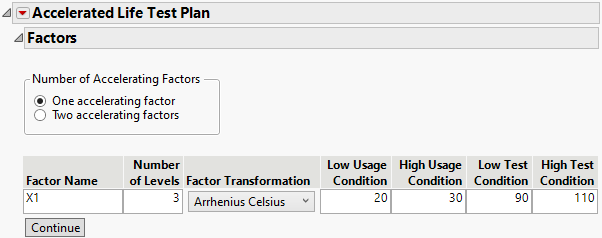Specify the ALT Acceleration Factors
The first step for an accelerated life test (ALT) design is to define the accelerating factors and design type.
Figure 28.1 Initial ALT Test Plan Window
Number of accelerating Factors
One accelerating factor
Select for a design with one factor.
Two accelerating factors
Select for a design with two factors.
Include interaction term
(Available only for two factor models.) Select to include interaction term.
Factor Name
Enter a name for each acceleration factor.
Number of Levels
For each acceleration factor, enter the number of levels to include in the experiment.
Factor Transformation
For each acceleration factor, select a transformation function. This transformation describes the life-stress relationship, which is the manner in which the life distribution changes across stress levels. The transformations available are Arrhenius Celsius, Reciprocal, Log, Square Root, and Linear.
Low Usage Condition
For each acceleration factor, enter a lower bound for its value in typical usage conditions.
High Usage Condition
For each acceleration factor, enter an upper bound for its value in typical usage conditions.
Note: The Low Usage Condition and High Usage Condition values can be equal. Use equal values when the usage condition is a single value.
Low Test Condition
For each acceleration factor, enter the low test condition.
High Test Condition
For each acceleration factor, enter the high test condition.
Note: The low and high test conditions define the endpoints of the acceleration factors in the design. The initial candidate runs are equally spaced levels between the low and high test conditions. You can adjust the levels before constructing the design.
